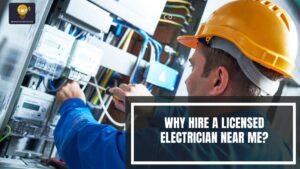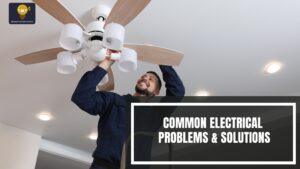The Homeowner’s Survival Guide to Upgrading Electrical Panel
Upgrading electrical panel isn’t just an improvement—it’s a safety requirement for many homeowners today. As homes continue to fill with smart appliances, powerful HVAC systems, and high-demand electronics, the need for a strong and reliable electric service becomes essential. If your panel is outdated, overloaded, or malfunctioning, it’s time to take action.
In this article, you’ll find a clear, detailed explanation of why upgrading your electrical panel matters, how it impacts general electrical repairs, and what every homeowner must understand before starting the process.
Outdated Electrical Panels Are a Growing Risk
Many homes nationwide still rely on electrical panels installed 30, 40, or even 50 years ago. These panels were never designed to handle the electrical demands of today’s homes. The result? Frequent breaker trips, overheating wires, and increased fire risk.
Fuse boxes and old circuit breaker panels lack the capacity and safety features of modern systems. Homeowners who ignore these limitations face potential hazards, unreliable power, and mounting electrical issues. The risks become more severe with every new appliance added to the home.
Signs Your Electrical Panel Can’t Keep Up
You may not realize your home’s electric service is struggling—until something fails. Here are signs your panel is past its prime:
- Breakers trip constantly, even with normal use.
- Lights dim when large appliances turn on.
- Burning smells or warm panel surfaces.
- A fuse box instead of modern circuit breakers.
- You hear buzzing or crackling from the panel.
- Outlets or switches stop working randomly.
- The panel is labeled below 100 amps.
These problems signal danger. Overloaded circuits and old breakers can lead to fires. Ignoring these signs won’t make them go away. In fact, each delay increases the chance of damage, costly repairs, or injury.
Why Upgrading Electrical Panel Matters
Upgrading electrical panel replaces outdated, overworked equipment with a new, code-compliant system that supports modern electrical needs. This upgrade brings several important benefits that directly impact the safety, reliability, and future readiness of your home’s electrical service.
1. Supports More Power Where You Need It
New electrical panels deliver higher amp service—commonly 200 amps—compared to older models that provide only 60 to 100 amps. This increase allows your home to run multiple high-demand appliances without overloading the system. You can safely operate central air systems, electric ranges, water heaters, or even EV chargers without tripping breakers. As a result, your electric service runs more efficiently and consistently.
2. Improves Safety for Your Entire Home
Upgraded panels feature modern safety mechanisms designed to reduce the risk of fire, overheating, or circuit damage. These panels respond better to faults, such as short circuits or ground issues, cutting power quickly when needed. As safety codes evolve, older panels may no longer meet minimum requirements. A newer panel gives your home an extra layer of protection and brings your system up to date.
3. Reduces the Need for General Electrical Repairs
Outdated panels often cause frequent issues such as tripping breakers, flickering lights, or inconsistent power. These issues can lead to repeat service calls and rising repair costs. A new panel corrects many of these problems at the source. Providing a stable electrical foundation helps prevent system-wide issues and reduces the need for general electrical repairs over time.
4. Prepare your Home for Future Additions
Planning to add a home office, install solar panels, or buy an electric vehicle? These changes usually require more power than your old panel can supply. A panel upgrade provides enough capacity to handle new circuits and devices. It allows you to grow your system without worrying about performance limits.
5. Helps You Meet Electrical Code Requirements
Many cities and states have updated their building codes to require higher amperage panels in certain remodels or sales. Installing a new panel keeps your home compliant and ready for future inspections. This not only protects your home but can also speed up real estate transactions if you plan to sell later.
What’s Involved in Upgrading Electrical Panel?
Here’s what homeowners can expect when scheduling an upgrade:
Initial Inspection
A licensed electrician inspects your current panel, calculates your home’s load requirements, and recommends the right size upgrade—usually 100, 150, or 200 amps.
Permits and Utility Coordination
Your electrician pulls the necessary permits and may coordinate with the power company to temporarily shut off electricity during installation.
Panel Replacement
Workers removed the old panel. They installed a new panel, upgraded the breakers and wiring (if needed), and grounded the new system properly. They connected everything securely.
Final Testing and Inspection
After installation, everything is tested for proper function. Local authorities inspect the work to ensure code compliance and safety.
Costs and Timeframe
Upgrading an electrical panel typically costs between $1,500 and $3,500, depending on your home’s size and location. If the upgrading electrical panel includes service mast or meter work, the cost may be higher. Most jobs are completed within one day.
Though the investment may seem high, the long-term benefits far outweigh the initial cost, especially when it comes to safety, resale value, and peace of mind.
Common Questions Homeowners Ask
Is upgrading required if I haven’t had problems?
Even if everything “seems fine,” your panel may not meet current code. Waiting for a failure can be dangerous and more expensive.
Will I need a full home rewiring too?
Not necessarily. Many homes only need a new panel to handle the load. However, older homes may benefit from targeted rewiring in trouble spots.
Can I add an EV charger or generator after upgrading?
Yes. New panels are designed to support high-load additions. Discuss your future plans with your electrician before installation.
Conclusion: Take the First Step Toward a Safer, More Reliable Home
Upgrading your electrical panel is more than just a project—it’s a critical decision that protects your family, your home, and your wallet. It solves current power problems and prepares you for the future.
Don’t wait for a failure. If you’ve seen the signs or if your home is more than 30 years old, contact a licensed electrician for a professional evaluation today. A modern electric service isn’t just nice to have—it’s a must-have for any safe, efficient home.
FAQs About Upgrading Your Electrical Panel
- How do I know if my current electrical panel is too old?
Most electrical panels last 25 to 40 years. If yours is over 30 years old, has fuses instead of breakers, or shows signs of overheating or corrosion, it’s likely outdated and should be inspected by a licensed electrician.
- Can I upgrade my electrical panel myself?
No, upgrading an electrical panel is not a DIY job. It involves working with high-voltage electricity, local codes, and utility coordination. Always hire a licensed electrician to ensure the work is safe, legal, and properly inspected.
- Will a panel upgrade lower my energy bills?
While it won’t directly reduce your energy usage, a new panel improves system efficiency and reduces strain on circuits. This can prevent energy waste and lead to fewer repairs and maintenance costs over time.
- Do I need a panel upgrade to install an EV charger or solar panels?
In many cases, yes. EV chargers and solar systems require additional circuits and more electrical capacity. If your existing panel can’t support the added load, an upgrade is necessary for safe and proper operation.
- How long does upgrading electrical panel take to complete?
Most upgrades are completed in one day. However, scheduling, permit approvals, and inspections may take several days before and after installation. Your electrician will guide you through the full timeline.
Ready to upgrade your home’s electrical panel? Contact NT Electrician today for expert service, safe installations, and reliable power solutions tailored to your needs. Get your free estimate now!




